Hard water was ruining my life—stiff laundry, spotty dishes, and dry skin were my daily battles. Then I found the Genesis water softener, and let me tell you, it’s been a game-changer. If you’re tired of hard water woes, you need this system in your home.
It’s efficient, reliable, and worth every penny. In this article, I’ll share my personal experience, break down the pros and cons, compare it to other brands, and give you maintenance tips to keep it running smoothly.
Trust me, you’ll want a Genesis after reading this.
My Journey With The Genesis Water Softener
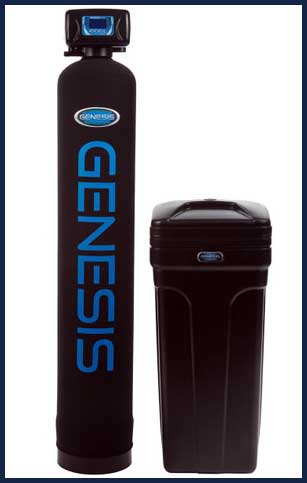
Picture this: I move into a new house, excited for a fresh start, only to discover the water feels like it’s been pulled straight from a limestone quarry.
My dishes came out of the dishwasher looking like they’d been dusted with chalk, my clothes felt like cardboard, and my skin was so dry I was slathering lotion like it was my job.
I knew I needed a water softener, but the options were overwhelming.
After hours of research, I landed on the Genesis 2 Premier 48,000 Grain Upflow Water Softener from Discount Water Softeners.
Why?
It promised efficiency, durability, and a user-friendly experience, and I was desperate for a solution.
Installing it was surprisingly straightforward. I’m no plumber, but with the included Quick Pro Connector kit, I had it hooked up in under an hour. The instructions were clear, and the YouTube videos from Discount Water Softeners sealed the deal.
Once it was up and running, the difference was night and day. My water tasted cleaner, my skin felt softer, and my glassware sparkled. The digital control head was a lifesaver, letting me set it once and forget it. It tracks water usage and regenerates only when needed, which means I’m not wasting salt or water.
After six months, I’m still amazed at how it’s transformed my home. My only regret? Not getting it sooner.
The Genesis 2 Premier uses upflow regeneration, which I’ll explain later, but it’s a big reason why it’s so efficient. It’s not perfect—there are a couple of quirks—but it’s been a reliable workhorse. I’ve tested it with water hardness at 15 grains per gallon (GPG), and it handles it like a champ.
If you’re on the fence, let me walk you through why this system stands out, where it falls short, and how to keep it running like a dream.
Pros of The Genesis Water Softener
- Unmatched Efficiency with Upflow Technology
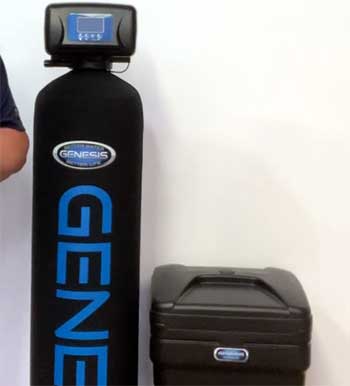
The Genesis 2 Premier’s upflow regeneration is its secret weapon.
Unlike traditional downflow systems that push water through the resin from top to bottom, upflow sends water from the bottom up, creating a swirling motion that cleans the resin more effectively.
This means it uses up to 75% less salt and 64% less water during regeneration compared to brands like Fleck.
For my family of four, this translates to saving about 6,480 pounds of salt and 28,900 gallons of water annually.
That’s not just good for my wallet; it’s a win for the environment too.
- User-Friendly Digital Control Head
I’m not a tech wizard, but the digital metered control head on the Genesis is a breeze to use. You set your water hardness, household size, and water type (city or well), and it does the rest. The LED display shows flow rate, last regeneration, and remaining capacity, so you’re never guessing.
It even saves settings during power outages, which is a relief since my old system would reset and leave me with hard water for days. Programming took me 10 minutes, and now it’s a set-it-and-forget-it deal.
- Durable Build and Long-Lasting Components
The Genesis is built like a tank. The 10% crosslink resin is top-tier, designed to last up to 20 years, and the system comes with a lifetime warranty on both the resin and brine tanks. The control valve, with its ceramic disc design, is a step above the rubber seals in other brands that wear out over time.
I’ve had zero leaks or malfunctions in six months, and the neoprene jacket on the tank keeps it looking sleek while reducing condensation. It’s made in the USA, which gives me confidence in its quality.
- High Flow Rate for Busy Households
With a flow rate of 11.2 gallons per minute (GPM) for the 48,000-grain model, the Genesis handles my household’s demands without breaking a sweat. Whether we’re running the dishwasher, washing machine, and shower simultaneously, the water pressure stays steady.
The 1.25-inch internal piping helps maintain consistent flow, unlike some systems with 1-inch pipes that choke under heavy use. This is a huge plus for larger families or homes with high water consumption.
- Eco-Friendly and Cost-Effective
The upflow system’s efficiency isn’t just about saving water and salt—it’s about saving money. I spend about $150 a year on salt, compared to $250-$300 for my friend’s Fleck system.
The Genesis also has a reverse flow regeneration feature that preserves unused resin, further cutting salt use by up to 30%. Plus, the automatic system refresh flushes stagnant water every seven days, preventing bacterial growth without me lifting a finger. It’s low-maintenance and eco-conscious, which I love.
Not-So-Good Parts of The Genesis Water Softener
- Upfront Cost Can Sting
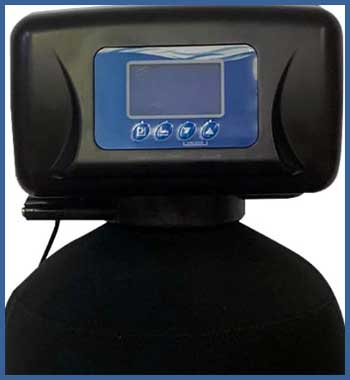
Let’s talk numbers.
The Genesis 2 Premier isn’t cheap, with prices ranging from $929 to $2,859 depending on grain capacity.
My 48,000-grain model set me back about $1,500, which felt steep compared to budget options like the Rheem RHS32, which costs around $800.
While the long-term savings on salt and water are real, the initial investment might make you hesitate if you’re on a tight budget.
I justified it by focusing on the lifetime warranties and efficiency, but it’s still a hit to the wallet.
- No Included Sediment Prefilter
One thing that annoyed me was the lack of a sediment prefilter. If your water has dirt, rust, or sand, you’ll need to buy a separate prefilter to protect the resin. My water is relatively clean (city supply), but I still spent $50 on a basic prefilter to be safe.
Brands like SpringWell often include these in their packages, so it’s a small oversight by Genesis. It’s not a dealbreaker, but it would’ve been nice to have everything in one box.
- Mixed Customer Service Experiences
While I had a smooth experience with Discount Water Softeners’ support (they answered my installation questions promptly), some online reviews paint a different picture. A few customers reported slow response times or issues with warranty claims, like a “red sheet” in the box stating no warranty, despite advertised lifetime coverage.
I haven’t needed warranty service yet, but these complaints make me a bit wary. If top-notch customer service is a must for you, you might want to research local suppliers as a backup.
- Occasional Salt Bridging Issues
Salt bridging—when salt in the brine tank forms a hard crust—popped up once in my system. It stopped the salt from dissolving properly, and I had to break it up with a broom handle. This isn’t unique to Genesis (it’s common in salt-based systems), but it was a hassle.
The company suggests checking the brine tank every few months, which I now do religiously. If you’re forgetful about maintenance, this could catch you off guard.
Maintenance Tips For Your Genesis Water Softener
- Check and Refill the Brine Tank Regularly
Your Genesis needs salt to regenerate, so keep an eye on the brine tank. I check mine every three months, aiming to keep it at least half-full. For my 48,000-grain system, I use about 9 pounds of salt per regeneration, which costs me roughly $40 every three months with standard salt pellets.
Use high-quality salt pellets or crystals to avoid impurities, and never let the tank run empty—it’ll mess with regeneration and leave you with hard water.
- Inspect for Salt Bridging
As I mentioned, salt bridging can be a pain. Every three to four months, poke around in the brine tank with a long stick to ensure the salt hasn’t formed a solid crust. If it has, break it up gently to keep the salt dissolving properly.
I learned this the hard way when my system stopped softening for a couple of days. Keeping the tank dry and using clean salt helps prevent this issue.
- Clean the Resin Tank Annually
The resin tank is the heart of your Genesis, and it needs a yearly cleaning to stay in top shape. I use a resin bed cleaner (about $10 a bottle) and follow the manual’s instructions to flush the system.
This removes any sediment or iron buildup that could clog the resin. It takes about 20 minutes, and it’s worth it to extend the resin’s 20-year lifespan. If your water has high iron content, you might need to do this every six months.
- Monitor the Control Head and Drain Line
The digital control head is low-maintenance, but I check it monthly to ensure the display is working and the settings haven’t glitched. Also, make sure the drain line isn’t clogged—mine got backed up once from debris, and it caused a minor overflow.
A quick rinse with a garden hose fixed it. If you notice reduced water pressure or frequent regenerations, check the drain line and injector assembly for blockages.
- Schedule a Professional Tune-Up Every Few Years
While the Genesis is DIY-friendly, I plan to have a plumber check it every three years to catch any wear on the ceramic disc or other components. This costs about $100-$150 but ensures the system stays reliable.
The lifetime warranty covers the tanks and valve, so any major issues should be covered, but a pro can spot minor problems before they escalate.
Comparison of Genesis Water Softener With Other Brands
Let’s put the Genesis 2 Premier 48,000 Grain Upflow Water Softener head-to-head with NorthStar, ScaleBlaster, Sterling, and Novo. I’ll break down how they compare in key areas to help you decide which is best for your home.
- Genesis Vs. NorthStar
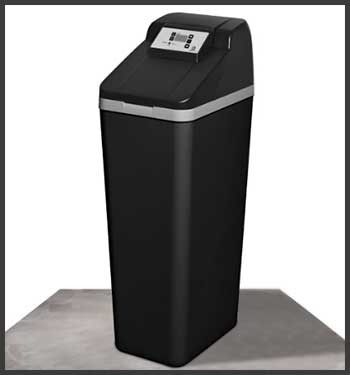
NorthStar, owned by EcoWater, offers reliable single and dual-tank systems like the NSC31 and NST30ED, with grain capacities from 22,090 to 35,600.
Genesis’s 48,000-grain capacity and upflow regeneration outshine NorthStar’s downflow systems, which use about 15 pounds of salt and 80 gallons of water per cycle compared to Genesis’s 9 pounds and 44 gallons.
NorthStar’s “Look Ahead” technology optimizes regeneration based on usage, but Genesis’s digital control head does the same with a more intuitive interface.
NorthStar’s single-tank models are cheaper ($700-$1,100), but reviews highlight spotty technical support and occasional breakdowns after two years.
Genesis’s lifetime warranties and higher flow rate (11.2 GPM vs. NorthStar’s 9 GPM) make it better for larger households.
- Genesis Vs. ScaleBlaster
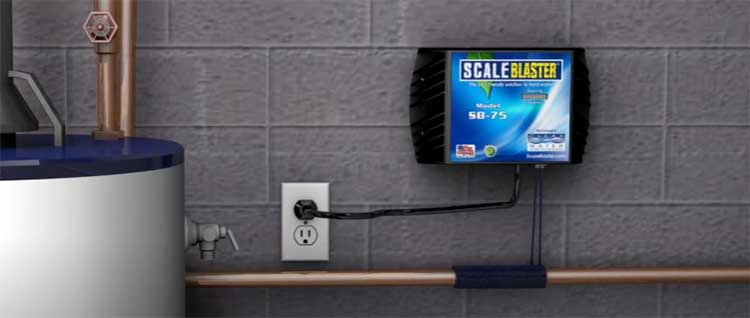
ScaleBlaster’s SB-75 and SB-Elite are salt-free conditioners, not true softeners, using electronic waves to reduce limescale adhesion up to 19 GPG. They’re low-maintenance, don’t need salt, and cost $200-$600, but they don’t soften water or remove minerals like Genesis does.
If you have very hard water (15+ GPG), ScaleBlaster won’t match Genesis’s effectiveness. Customer reviews are mixed, with some noting no difference in limescale.
Genesis’s salt-based system ensures soft water for dishes, laundry, and skin, making it the clear choice unless you want a maintenance-free but less effective option.
- Genesis Vs. Sterling
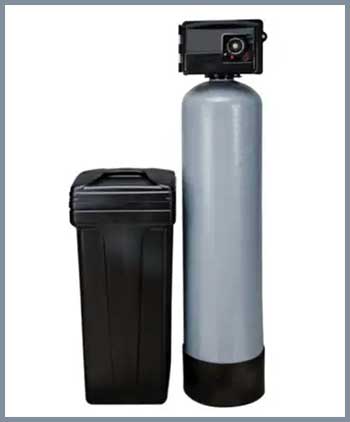
Sterling, often equipped with Clack WS-1 valves, is a solid choice for city water, with models starting at $900.
Its single-tank systems, like the Sterling L, handle 30,000-40,000 grains and are praised for durability and easy repairs.
However, Sterling’s downflow regeneration uses more salt (12-15 pounds per cycle) than Genesis’s upflow system.
Sterling’s valves are reliable, but Genesis’s ceramic disc valve and lifetime tank warranties offer better longevity.
For households with moderate hardness (9-18 GPG), Sterling’s a strong contender, but Genesis edges out with efficiency and higher flow rates for busier homes.
- Genesis Vs. Novo
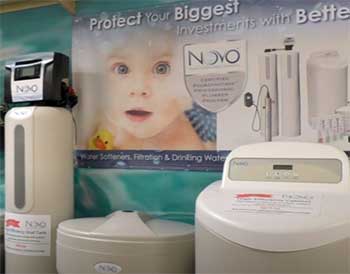
Novo (often confused with Nuvo) offers salt-based softeners in the $800-$1,200 range, but reviews suggest inconsistent performance and limited model variety.
Novo’s systems use standard downflow regeneration, less efficient than Genesis’s upflow, and lack advanced features like Genesis’s digital metered head.
Novo’s warranties are typically 5-10 years, shorter than Genesis’s lifetime coverage.
For small to medium homes, Novo might suffice, but Genesis’s higher capacity (48,000 grains vs. Novo’s 30,000-40,000) and resource savings make it a better pick for families with higher water usage or harder water.
Why Genesis Stands Out?
Genesis wins for me because of its upflow technology, which saves salt and water, and its robust 11.2 GPM flow rate, perfect for my busy household. NorthStar’s affordability and Sterling’s repairable valves are appealing, but they can’t match Genesis’s efficiency or warranties. ScaleBlaster’s salt-free approach is low-maintenance but falls short for hard water.
Novo’s budget-friendly price is tempting, but its shorter warranties and lackluster performance don’t compare. If you want a reliable, efficient, and long-lasting softener, Genesis is the way to go.
Frequently Asked Questions (FAQ)
Choosing the “best” brand depends on your needs, but I’d put Genesis at the top for its efficiency and durability. SpringWell is a close second for its prefilter and app, while Fleck is great for budget-conscious buyers. Culligan’s premium features are nice but overkill for most homes. Genesis’s upflow technology and lifetime warranties make it my pick for value and performance.
Genesis water softeners are engineered and assembled in the USA, sold exclusively by Discount Water Softeners. The exact manufacturer isn’t disclosed for proprietary reasons, but the components, like the 10% crosslink resin, are sourced from North America, ensuring high quality.
A well-maintained water softener, like the Genesis, can last 10-20 years. The resin typically lasts 15-20 years, while tanks and valves can go longer with proper care. Genesis’s lifetime warranties on tanks and valves add extra reassurance, though you may need to replace minor parts over time.
Pellets are my go-to for the Genesis because they dissolve evenly and are less likely to cause bridging. Crystals can work but often have impurities that clog the system. Pellets are slightly pricier (about $10 per 40-pound bag vs. $8 for crystals), but they’re worth it for smoother operation.
Conclusion: Why You Should Get A Genesis Water Softener?
After living with hard water’s chaos, the Genesis 2 Premier has been a lifesaver. It’s efficient, durable, and makes my water feel like a luxury. The upfront cost is worth the long-term savings and hassle-free operation.
Whether you’re battling spotty dishes or dry skin, this system delivers. Don’t wait like I did—grab a Genesis and transform your home’s water today. You’ll thank yourself every time you step out of the shower or sip a glass of water.
